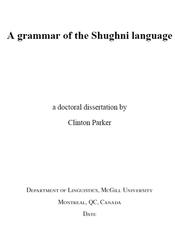This dissertation provides a comprehensive grammatical description of Shughni, an understudied Eastern Iranian language spoken in Afghanistan and Tajikistan. Contributing to this goal are three primary objectives: (I) to identify, analyze, and describe areas of the language’s grammar which have heretofore not been investigated; (II) to synthesize and build upon existing research on the language, much of which was published in Russian during the Soviet era and has therefore been hard to access for many scholars outside the former Soviet Union; and (III) to point out phenomena in Shughni which are not covered in depth here and are ripe for future investigation. Novel contributions of this thesis include, among others, an analysis of definiteness in Shughni nominals, a thorough description of the language’s system of triple deixis, particularly as it pertains to demonstratives and adverbs, and a description of tense and aspect situated in a Neo-Reichenbachian framework. It provides a thorough description of morphosyntactic alignment in Shughni from synchronic, diachronic, and typological perspectives, and it builds upon the work of Soviet-era scholars in providing a historical account of several irregularities found in the modern Shughni verbal system, notably the suppletion in infinitive, present, and past stems, as well as the development of syncretism in feminine and plural past and perfect forms. Ultimately, it is the author’s hope that this thesis will both contribute to the documentation of Shughni and spur future research into un(der)-investigated areas of its grammar.

